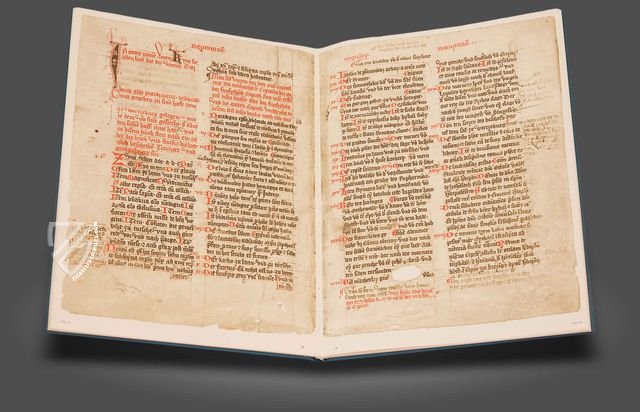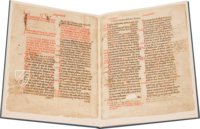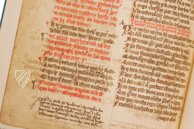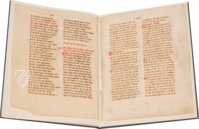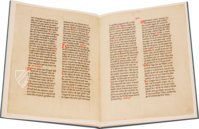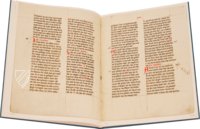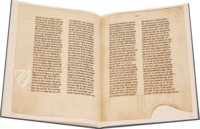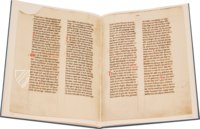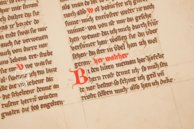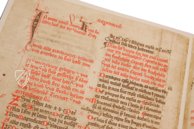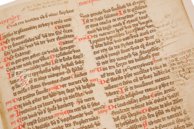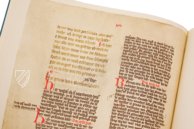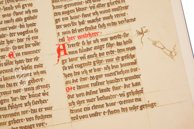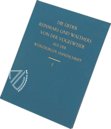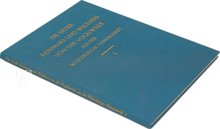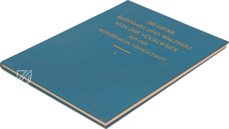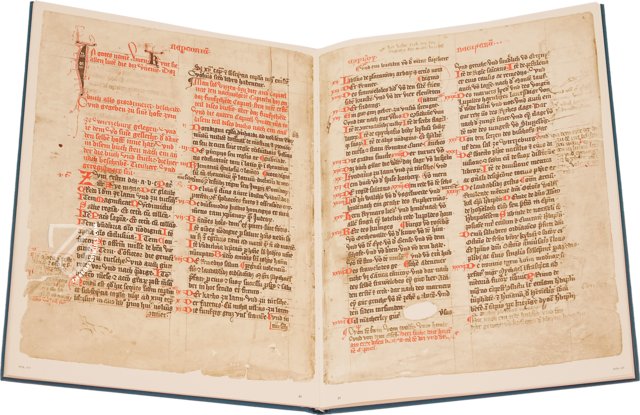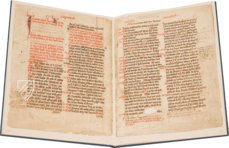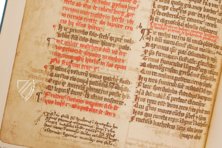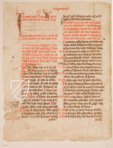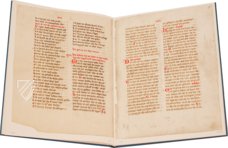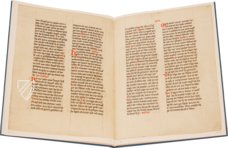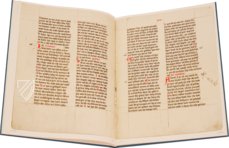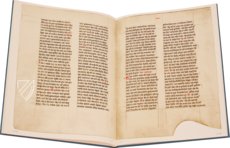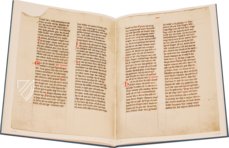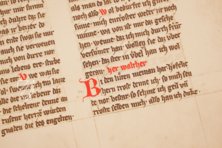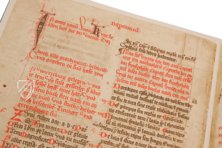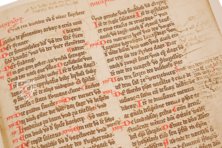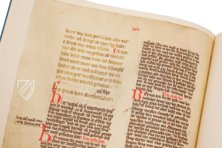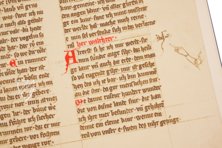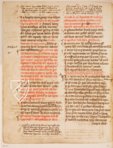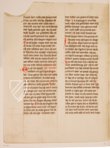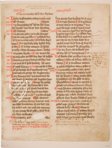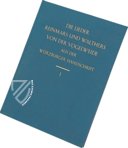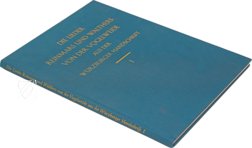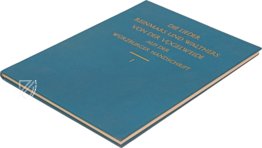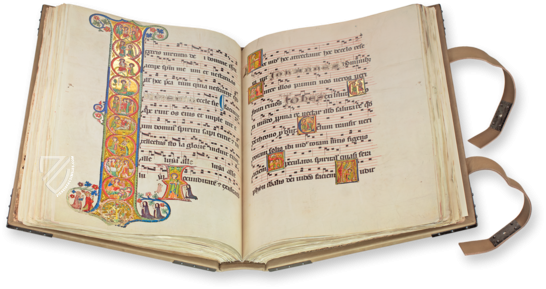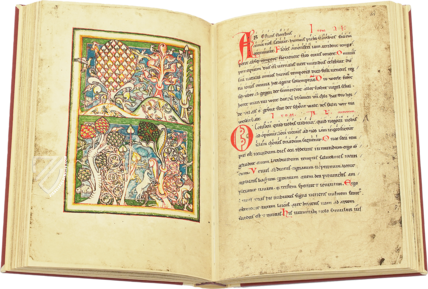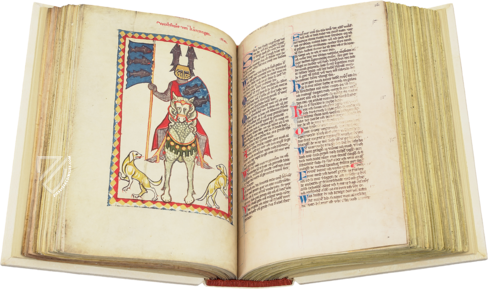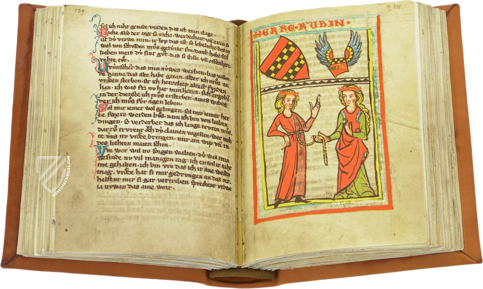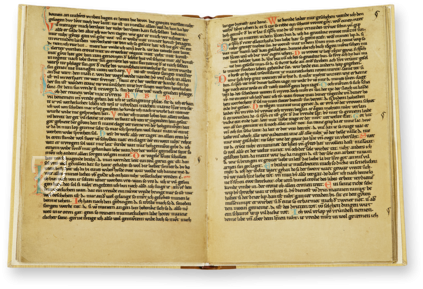Würzburger Liederhandschrift
(under 1,000€)
The Munich University Library preserves one of the most significant manuscripts of Middle High German poetry, which is simultaneously the only copy of the oldest surviving German-language cookbook: the so-called Würzburger Liederhandschrift. In addition to the extensive collection of recipes and numerous works by Walther von der Vogelweide, Reinmar von Hagenau, Heinrich von Morungen, Lupold von Hornburg, the Stricker and Konrad von Würzburg, the anthology comprises Latin and German prayers, aphorisms and riddles. It is the second volume of the Housebook of Michael de Leone, a two-volume mammoth project that the Würzburg patrician probably intended as a reference work for his descendants. It was created between around 1345 and 1355 by at least 12 scribes who worked under the guidance of Michael de Leone's personal scribe Gyselher. The codex is a unique testimony to medieval minnesong and allows us fascinating insights into the urban-aristocratic everyday culture of the 14th century.
Würzburger Liederhandschrift
The Würzburger Liederhandschrift is the second volume of an extensive housebook commissioned by the Würzburg protonotary Michael de Leone (ca. 1300–1355). After studying at the University of Bologna, he moved back to Würzburg and acquired the Hof zum großen Löwen, which was once owned by the Knights Templar and from which he derived his byname. With his housebook, begun around 1345, he probably wanted to create a reference work for his descendants, with which he also immortalized himself in the family history.
A Housebook Full of Poetry
The Housebook of Michael de Leone is famous for the included works of Walter von der Vogelweide (around 1170 – around 1230) and Reinmar von Hagenau, two of the most renowned German-language poets of the High Middle Ages. The passages attributed to them also include several strophes by the equally gifted minnesinger Heinrich von Morungen († after August 17, 1218). All three are known and handed down to us today primarily from the Codex Manesse, the Weingarten Manuscript and the Kleine Heidelberger Liederhandschrift. What makes Michael de Leone's housebook unique is that it also contains the only surviving copies of poems by Lupold von Hornburg. The first double-page of the manuscript also bears the message about Walther von der Vogelweide's funeral.
Medieval Cuisine
The housebook is also the only preserved manuscript that contains the Bůch von gůter spîse or Buch von guter Speise – the oldest known German-language cookbook. It consists of a culinary collection of 101 recipes, ranging from simpler creations to fasting meals and elaborate show dishes. In particular, the mention of numerous costly imported spices such as pepper, saffron and cloves, as well as recipes with venison, testify to an aristocratic audience and fit in with the patrician patron.
A Mammoth Project of Many Hands
At least 12 different scribes realized the once two-volume housebook with a total of 33 chapters under the instruction and coordination of Gyselher, Michael de Leone's personal master scribe. While the second volume, the Würzburger Liederhandschrift, which alone comprises 568 pages, is preserved almost in its entirety in the Munich University Library, only a few fragments of the first volume have survived the test of time and are now kept in the Bavarian State Library under the shelfmark Cgm 195,1.
The large parchment pages of the mammoth work were written in two columns in neat textura formata, a particularly legible Gothic script, and structured with numerous red and blue initials and rubrics. Michael de Leone's hand is also repeatedly present in marginal notes, which speaks for his active involvement in the creation of the codex. After the preliminary completion of the housebook in 1350, it was continually expanded in the following years.
A Part of Würzburg (Family) History
Michael bequeathed the valuable compendium to his nephew Jakob de Leone (1336–1400), who also took over the Great Lion Court from his uncle in 1353. He was a member of the Lower Council of Würzburg and later Mayor of the city. After his death, the manuscript probably remained in Würzburg and was acquired in the 16th century by the Augsburg Bishop Johann Egolph von Knöringen (1537–1575). His library finally passed it on to the University Library of Ingolstadt in 1573, where the housebook was kept for the entire modern period.
Codicology
- Alternative Titles
- Die Lieder Reinmars und Walthers von der Vogelweide aus der Würzburger Handschrift 2° Cod. ms. 731 der Universitätsbibliothek München
The Songs of Reinmar and Walther von der Vogelweide in the Würzburg Manuscript
Hausbuch Michaels de Leone
Housebook of Michael de Leone - Size / Format
- 568 pages / 34.5 × 26.5 cm
- Origin
- Germany
- Date
- Ca. 1345–1354
- Epochs
- Style
- Script
- Textura formata
- Illustrations
- Initials, rubrics
- Content
- An extensive collection of Latin and German literature, including primarily poetry, but also prayers, aphorisms and riddles; "Buoch von guoter spise", the oldest German-language cookbook
- Patron
- Michael de Leone († 1355)
- Artist / School
- Michael de Leone
Gyselher
At least 12 different scribes - Previous Owners
- Jakob de Leone († 1400)
Johann Egolph von Knöringen, Bishop of Augsburg (1537–1575)
Würzburger Liederhandschrift
Repertorium
The first page of the Würzburg song manuscript begins with a praise to God (“In gotes namen Amen”) and a note of ownership in red display script. This is followed by a list of the contents of the first, lost book. The second block in red display script leads to the index of the second book.
Remarkably, the hand A that wrote this page probably corresponds to Michael de Leone himself, who commissioned the anthology. A later user of the manuscript drew a so-called manicule, a pointing hand, in the lower margin, indicating the addition in the left margin. This was obviously an important place for the respective person.
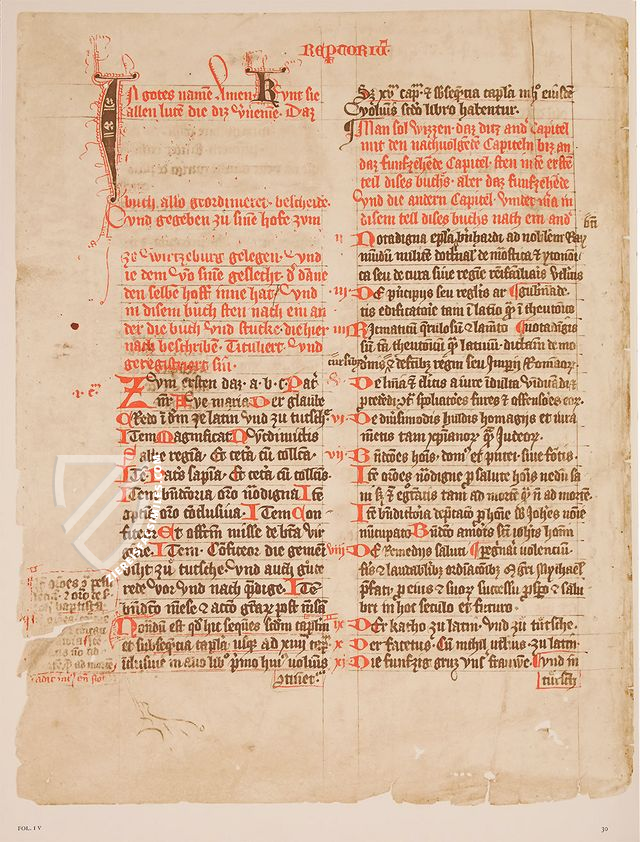
#1 Die Lieder Reinmars und Walthers von der Vogelweide aus der Würzburger Handschrift 2° Cod. ms. 731 der Universitätsbibliothek München
Language: German
(under 1,000€)
- Treatises / Secular Books
- Apocalypses / Beatus
- Astronomy / Astrology
- Bestiaries
- Bibles / Gospels
- Chronicles / History / Law
- Geography / Maps
- Saints' Lives
- Islam / Oriental
- Judaism / Hebrew
- Single Leaf Collections
- Leonardo da Vinci
- Literature / Poetry
- Liturgical Manuscripts
- Medicine / Botany / Alchemy
- Music
- Mythology / Prophecies
- Psalters
- Other Religious Books
- Games / Hunting
- Private Devotion Books
- Other Genres
- Afghanistan
- Armenia
- Austria
- Belgium
- Belize
- Bosnia and Herzegovina
- China
- Colombia
- Costa Rica
- Croatia
- Cyprus
- Czech Republic
- Denmark
- Egypt
- El Salvador
- Ethiopia
- France
- Germany
- Greece
- Guatemala
- Honduras
- Hungary
- India
- Iran
- Iraq
- Israel
- Italy
- Japan
- Jordan
- Kazakhstan
- Kyrgyzstan
- Lebanon
- Liechtenstein
- Luxembourg
- Mexico
- Morocco
- Netherlands
- Palestine
- Panama
- Peru
- Poland
- Portugal
- Romania
- Russia
- Serbia
- Spain
- Sri Lanka
- Sweden
- Switzerland
- Syria
- Tajikistan
- Turkey
- Turkmenistan
- Ukraine
- United Kingdom
- United States
- Uzbekistan
- Vatican City
- A. Oosthoek, van Holkema & Warendorf
- Aboca Museum
- Ajuntament de Valencia
- Akademie Verlag
- Akademische Druck- u. Verlagsanstalt (ADEVA)
- Aldo Ausilio Editore - Bottega d’Erasmo
- Alecto Historical Editions
- Alkuin Verlag
- Almqvist & Wiksell
- Amilcare Pizzi
- Andreas & Andreas Verlagsbuchhandlung
- Archa 90
- Archiv Verlag
- Archivi Edizioni
- Arnold Verlag
- ARS
- Ars Magna
- ArtCodex
- AyN Ediciones
- Azimuth Editions
- Badenia Verlag
- Bärenreiter-Verlag
- Belser Verlag
- Belser Verlag / WK Wertkontor
- Benziger Verlag
- Bernardinum Wydawnictwo
- BiblioGemma
- Biblioteca Apostolica Vaticana (Vaticanstadt, Vaticanstadt)
- Bibliotheca Palatina Faksimile Verlag
- Bibliotheca Rara
- Boydell & Brewer
- Bramante Edizioni
- Bredius Genootschap
- Brepols Publishers
- British Library
- C. Weckesser
- Caixa Catalunya
- Canesi
- CAPSA, Ars Scriptoria
- Caratzas Brothers, Publishers
- Carus Verlag
- Casamassima Libri
- Centrum Cartographie Verlag GmbH
- Chavane Verlag
- Christian Brandstätter Verlag
- Circulo Cientifico
- Club Bibliófilo Versol
- Club du Livre
- CM Editores
- Collegium Graphicum
- Collezione Apocrifa Da Vinci
- Comissão Nacional para as Comemorações dos Descobrimentos Portugueses
- Coron Verlag
- Corvina
- CTHS
- D. S. Brewer
- Damon
- De Agostini/UTET
- De Nederlandsche Boekhandel
- De Schutter
- Deuschle & Stemmle
- Deutscher Verlag für Kunstwissenschaft
- DIAMM
- Droz
- E. Schreiber Graphische Kunstanstalten
- Ediciones Boreal
- Ediciones Grial
- Ediclube
- Edições Inapa
- Edilan
- Editalia
- Edition Deuschle
- Edition Georg Popp
- Edition Leipzig
- Edition Libri Illustri
- Editiones Reales Sitios S. L.
- Éditions de l'Oiseau Lyre
- Editions Medicina Rara
- Editorial Casariego
- Editorial Mintzoa
- Editrice Antenore
- Editrice Velar
- Edizioni Edison
- Egeria, S.L.
- Eikon Editores
- Electa
- Emery Walker Limited
- Enciclopèdia Catalana
- Eos-Verlag
- Ephesus Publishing
- Ernst Battenberg
- Eugrammia Press
- Extraordinary Editions
- Fackelverlag
- Facsimila Art & Edition
- Facsimile Editions Ltd.
- Facsimilia Art & Edition Ebert KG
- Faksimile Verlag
- Feuermann Verlag
- Folger Shakespeare Library
- Franco Cosimo Panini Editore
- Friedrich Wittig Verlag
- Fundación Hullera Vasco-Leonesa
- G. Braziller
- Gabriele Mazzotta Editore
- Gebr. Mann Verlag
- Gesellschaft für graphische Industrie
- Getty Research Institute
- Giovanni Domenico de Rossi
- Giunti Editore
- Graffiti
- Grafica European Center of Fine Arts
- Guido Pressler
- Guillermo Blazquez
- Gustav Kiepenheuer
- H. N. Abrams
- Harrassowitz
- Harvard University Press
- Helikon
- Hendrickson Publishers
- Henning Oppermann
- Herder Verlag
- Hes & De Graaf Publishers
- Hoepli
- Holbein-Verlag
- Houghton Library
- Hugo Schmidt Verlag
- Idion Verlag
- Il Bulino, edizioni d'arte
- ILte
- Imago
- Insel Verlag
- Insel-Verlag Anton Kippenberger
- Instituto de Estudios Altoaragoneses
- Instituto Nacional de Antropología e Historia
- Introligatornia Budnik Jerzy
- Istituto dell'Enciclopedia Italiana - Treccani
- Istituto Ellenico di Studi Bizantini e Postbizantini
- Istituto Geografico De Agostini
- Istituto Poligrafico e Zecca dello Stato
- Italarte Art Establishments
- Jan Thorbecke Verlag
- Johnson Reprint Corporation
- Josef Stocker
- Josef Stocker-Schmid
- Jugoslavija
- Karl W. Hiersemann
- Kasper Straube
- Kaydeda Ediciones
- Kindler Verlag / Coron Verlag
- Kodansha International Ltd.
- Konrad Kölbl Verlag
- Kurt Wolff Verlag
- La Liberia dello Stato
- La Linea Editrice
- La Meta Editore
- Lambert Schneider
- Landeskreditbank Baden-Württemberg
- Leo S. Olschki
- Les Incunables
- Liber Artis
- Library of Congress
- Libreria Musicale Italiana
- Lichtdruck
- Lito Immagine Editore
- Lumen Artis
- Lund Humphries
- M. Moleiro Editor
- Maison des Sciences de l'homme et de la société de Poitiers
- Manuscriptum
- Martinus Nijhoff
- Maruzen-Yushodo Co. Ltd.
- MASA
- Massada Publishers
- McGraw-Hill
- Metropolitan Museum of Art
- Militos
- Millennium Liber
- Müller & Schindler
- Nahar - Stavit
- Nahar and Steimatzky
- National Library of Wales
- Neri Pozza
- Nova Charta
- Oceanum Verlag
- Odeon
- Orbis Mediaevalis
- Orbis Pictus
- Österreichische Staatsdruckerei
- Oxford University Press
- Pageant Books
- Parzellers Buchverlag
- Patrimonio Ediciones
- Pattloch Verlag
- PIAF
- Pieper Verlag
- Plon-Nourrit et cie
- Poligrafiche Bolis
- Presses Universitaires de Strasbourg
- Prestel Verlag
- Princeton University Press
- Prisma Verlag
- Priuli & Verlucca, editori
- Pro Sport Verlag
- Propyläen Verlag
- Pytheas Books
- Quaternio Verlag Luzern
- Reales Sitios
- Recht-Verlag
- Reichert Verlag
- Reichsdruckerei
- Reprint Verlag
- Riehn & Reusch
- Roberto Vattori Editore
- Rosenkilde and Bagger
- Roxburghe Club
- Salerno Editrice
- Saltellus Press
- Sandoz
- Sarajevo Svjetlost
- Schöck ArtPrint Kft.
- Schulsinger Brothers
- Scolar Press
- Scrinium
- Scripta Maneant
- Scriptorium
- Shazar
- Siloé, arte y bibliofilia
- SISMEL - Edizioni del Galluzzo
- Sociedad Mexicana de Antropología
- Société des Bibliophiles & Iconophiles de Belgique
- Soncin Publishing
- Sorli Ediciones
- Stainer and Bell
- Studer
- Styria Verlag
- Sumptibus Pragopress
- Szegedi Tudomànyegyetem
- Taberna Libraria
- Tarshish Books
- Taschen
- Tempus Libri
- Testimonio Compañía Editorial
- Thames and Hudson
- The Clear Vue Publishing Partnership Limited
- The Facsimile Codex
- The Folio Society
- The Marquess of Normanby
- The Richard III and Yorkist History Trust
- Tip.Le.Co
- TouchArt
- TREC Publishing House
- TRI Publishing Co.
- Trident Editore
- Tuliba Collection
- Typis Regiae Officinae Polygraphicae
- Union Verlag Berlin
- Universidad de Granada
- University of California Press
- University of Chicago Press
- Urs Graf
- Vallecchi
- Van Wijnen
- VCH, Acta Humaniora
- VDI Verlag
- VEB Deutscher Verlag für Musik
- Verlag Anton Pustet / Andreas Verlag
- Verlag Bibliophile Drucke Josef Stocker
- Verlag der Münchner Drucke
- Verlag für Regionalgeschichte
- Verlag Styria
- Vicent Garcia Editores
- W. Turnowski Ltd.
- W. Turnowsky
- Waanders Printers
- Wiener Mechitharisten-Congregation (Wien, Österreich)
- Wissenschaftliche Buchgesellschaft
- Wissenschaftliche Verlagsgesellschaft
- Wydawnictwo Dolnoslaskie
- Xuntanza Editorial
- Zakład Narodowy
- Zollikofer AG

